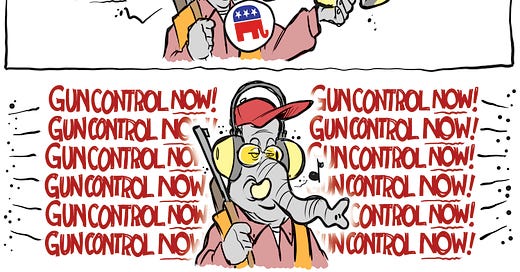It's A Political Problem
One of my early assignments in journalism was to report on the All City high school football preview for the old Oklahoma Journal.
“It was an explosive beginning to the 1975 prep football season Thursday night,” I wrote, referring to the 46 points the West rolled up on the East in a shutout victory, not anything that happened in the stands.
That description probably wouldn’t – and shouldn’t – be published today.
Not at a time when gunfire ended Choctaw-Del City football game, a gun was brandished, but thankfully not discharged at the Booker T. Washington-Bentonville West game, and another was confiscated from a student at the Locust Grove-Pryor game – all on the first weekend of the 2023 high school football season.
Uvalde, TX, Newtown, CT, Parkland, FL, and hundreds more alerted us years ago that no schoolhouse is immune from senseless violence. Must those gathering under the Friday Night Lights now keep their heads on a swivel, as well?
As the K-12 School Shooting Database lamented in a late August social media post, “Why hasn't a national media outlet written a story about 11 shootings at high school football games so far this month? Are we collectively indifferent to this much gun violence? It's so normal that it's not even newsworthy?”
What’s different now is ready access to guns. Not just six-shooters or double-barrel shotguns, but also weapons of war – assault rifles that can unleash a hail of bullets before anyone can even think about ducking.
This is a political problem that cries out to be solved.
Instead, what we all too often get, is cut-and-paste “thoughts and prayers” responses from elected officials unable to even conceive of ways to balance 2nd Amendment rights with the rights of families to safely enjoy watching their kids and neighbors’ kids play football or march in the band.
Gov. Kevin Stitt and Superintendent Ryan Walters were quick to condemn the violence and lament the loss of life, but not-so-quick to propose or take steps to do anything about it.
Isn’t it past time to commence a serious, in-depth conversation about how it is that teenagers attending games in Choctaw, Tulsa and Locust Grove not only had easy access to guns, but also thought it necessary to bring them to the football game?
The 2nd Amendment truly is the third rail of American politics, especially for Republicans whose base loves its firearms. It’s a mental health issue, they insist. Or they parrot the gun manufacturers’ line: Guns don’t kill people, people do.
Mental health undoubtedly is an issue. But to paraphrase Jesus, the angry and mentally ill will be with us always. State leaders talk about investing in mental health care, but they’ve never made it the priority it should be.
And the “guns don’t kill” line ignores two realities: 1. There are more guns in the U.S. than people. 2. Guns make it possible to snuff out a life in a nanosecond.
Remember when the worst thing that could happen at a high school football game was a couple of testosterone-filled, knuckleheaded teenagers exchanging punches?
This is a problem both state and federal lawmakers must solve. For example, Congress could revive the assault weapons ban it allowed to expire in 2004. The Supreme Court also has made clear Congress can regulate gun purchases and ownership.
With billions in the state’s savings accounts, Oklahoma lawmakers could help finance security equipment for school districts. They also could reconsider Red Flag laws designed to get weapons, at least temporarily, away from those experiencing mental health crises.
Lives are at stake. So is our sense of community if we no longer feel safe gathering to cheer on the hometown teams.





